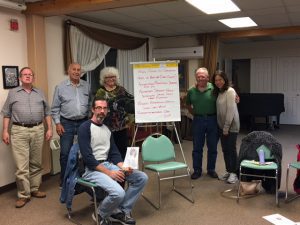By Janet Glass, president of the Ethical Culture Society of Bergen County
November is a favorite month for many of us because everything stops for Thanksgiving. It’s a chance to catch up with family and friends, some at home, others at restaurants, others in rental spaces. Part of the joy is that we come together without having to supply gifts, negotiate religious differences or arrange competing schedules. It’s also a time to turn our attention to food as we gather around a Thanksgiving table and appreciate earth’s bounty.
The Hunger Banquet: Ethical Culture Society members have the luxury of easy access to food. This is not true for everyone. On November 20, the Sunday school will focus on food scarcity and contamination in other places at its annual Hunger Banquet. This event will take place in the basement, out of sight of the adults in the building. Upstairs, in our main room, we will miss this discussion, so let’s consider some sobering facts here.
The Greenfaith Circle: Food abundance, scarcity and waste were a topic that the local Greenfaith Circle discussed at our meeting on September 29. South Presbyterian Church of Bergenfield, the Global Buddhist Council, Temple Emeth and Ethical Culture attended. Janet Glass, Ed Lipiner and Lou Steinberg represented Ethical Culture (see photo).
We all agreed to share some messages with our members, such as that the average
U.S. family wastes over 1,000 pounds of food per year while others go hungry, and supermarkets and restaurants throw out massive amounts of “expired” food. For that matter, in our own kitchens, we may wonder, “Is that yogurt really expired? Should I throw it out?” Besides, food waste isn’t just a hunger problem—it’s an environmental problem. Think about the environmental impacts of all that wasted food.
- The water used to irrigate the crops was wasted.
- The fuel used in the tractor when it was harvested or shipped to the store was wasted.
- The electricity in the store that refrigerated the food was wasted.
- The jars and cans and boxes that held the food were wasted and then thrown away.
Food waste generates a huge amount of greenhouse gas emissions. According to National Geographic, “the energy that goes into the production, harvesting, transporting, and packaging of that wasted food generates more than 3.3 billion metric tons of carbon dioxide. If food waste were a country, it would be the world’s third-largest emitter of greenhouse gases, behind the U.S. and China.”
Small Steps to Solutions: So, this Thanksgiving (and beyond), what are some simple things that we can do so that we contribute to solving this problem rather than adding to it? We can make the decision to buy just the food we need so we throw away less. We can compost at home or bring kitchen waste to Ethical for our composter. We can accept that produce can be top quality and taste great even if it is a slightly odd shape.
We can grow our own and give excess to neighbors or preserve it. We can question expiration dates. We can make sure leftovers are refrigerated quickly. We can ask for a take-home container for food that we don’t finish in restaurants. We may be able to donate excess food from our gardens to a food pantry. Finding a food pantry has been made easier by the nationwide website: AmpleHarvest.org. Just type in your ZIP code and you will be referred to a food pantry near you. If your closest food pantry will not accept fresh food, try to find one that will.
Also, in reference to expiration dates, Consumer Reports says: Food may not be at its peak after those dates, but such factors as staleness and color change are quality problems, not safety concerns. The truth is that, in many cases, food on a shelf—or even in a fridge—past the date on the package is fine to eat. That “expired food” doesn’t have to be thrown away. “Foodborne illness comes from contamination, not from the natural process of decay,” says Dana Gunders, a staff scientist at the Natural Resources Defense Council and the author of “Waste-Free Kitchen Handbook” (Chronicle Books, 2015). “And our senses are well-equipped to recognize decay.” Foods past their prime might develop mold, become rancid, or spoil in other ways, but they are likely to look, smell, and taste bad before they actually become unsafe to eat.
Bounty for All: So, please have a wonderful Thanksgiving, but let’s make sure our food does not go to waste. Let’s be as mindful of feeding the hungry as our Sunday School students at the Hunger Banquet. Let’s think about the huge cost to the environment that wasted food causes and pledge to ourselves and each other to do a bit more. After all, we may conclude that our yogurt is still good, and we’ll be a small step closer to less environmental degradation and more food in the world for us all.



